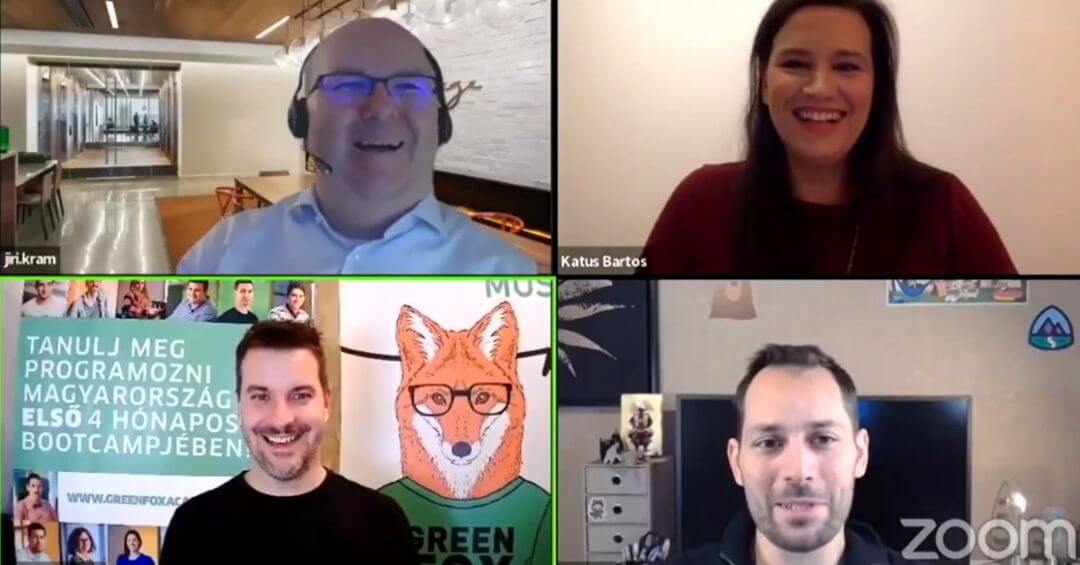What makes low-code a booming technology?
The low-code development platform market is expected to witness a notable annual growth rate of 31.3% during 2020–2030. According to P&S Intelligence, the market revenue will reach $190,792.6 million by 2030. This trend has a significant impact on the job market as well, creating a huge demand for low-code developers. In order to provide a better understanding of low-code and the opportunities it creates, we organized a roundtable discussion. Check out the key insights that came out of the session.

Jiri Kram, Manager at Accenture, Salesforce Practice, Philippe Ozil, Principal Developer Advocate at Salesforce and Kristóf Bárdos, CEO of Green Fox Academy joined the discussion to share their thoughts on the exciting potential in low-code programming. Besides the benefits, they explained its relevance for career-changers and shared their future predictions.
Approaching low-code development
The speakers agreed that low code is a tool which lets people with various domain knowledge creating more effective business processes.
It's also a game changer for people who already have a job and want to convert their knowledge into the software industry.
If you understand the process itself, you are able to create your own application. At the same time, it doesn’t mean that there is no need for technical knowledge.
Programming is still an important part of low-code solutions.
The present of the low-code
The surge of low-code technologies is basically driven by migration to the cloud which is happening at an incredible pace. To effectively handle the requirements of digital transformation more IT professionals are required. And that's the reason why more developers need to be involved in the IT industry besides pro-code developers.
Characteristics of low-code
As Philip pointed, when getting to larger projects, there are two main aspects you really need to think of. The first thing you really need to make sure that everything is documented and you have a proper plan. Code by essence is searchable, it is text, you can easily search for everything. For low-code it is a bit different. However, business needs are changing continously, so developers need to know the currently used system and understand how they can migrate from it or mitigate the risk. The second important aspect regarding low-code is quality. Rapid programming could result in inferior quality. Low-code developers need to make sure that their solution is robust and it adapts to future changes.
According to Kristóf the key benefit of low-code is that it can quickly transform ideas into solutions. It is especially valuable with ideas that haven’t been developed solely due to lack of resources. Certain business areas like finance, procurement, HR, marketing can be covered very well with platforms like SalesForce or ServiceNow. This is going to further boost low-code platforms’ applicability.
The speakers also addressed common misconceptions regarding low-code. First of all, low-code does require programming knowledge. Secondly, low-code developers do need to be great software engineers. They need to be familiar with object-oriented programming, understand databases and APIs. Furthermore, they ought to have strong soft skills and communication skills. Low-code developers become the part of the product team so they need to understand the needs from the business side.
What to expect as a junior
Low-code is the perfect gateway into digital careers. The technology can efficiently transform people’s interest and existing knowledge into customized IT solutions. They can address real-life business needs that couldn’t be solved with just configuration. Existing domain-specific knowledge is fully utilized on low-code platforms resulting solutions tailor-made to the company’s needs.
Kristóf also confirmed that they experience continuous demand for low-code developers from companies. The demand is fuelled by moving IT infrastructures to the cloud and with that programs and applications are becoming more and more low-code.
Watch the whole discussion to find out more about the opportunities and benefits of low-code.
If you are interested in learning about low-code platforms, check out our Junior Developer Course.






